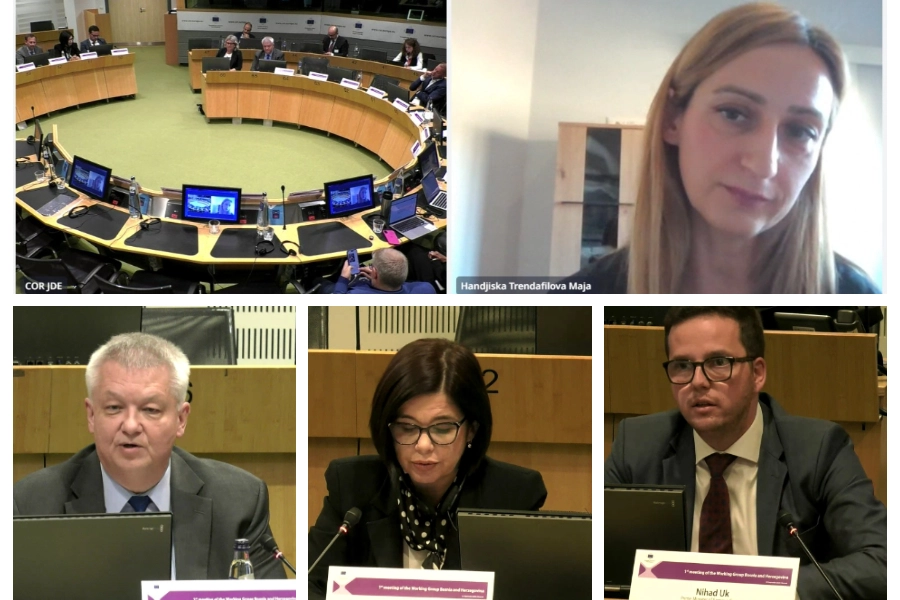
Handjiska-Trendafilova at CoR WG on Bosnia and Herzegovina Brought ReSPA’s Regional Perspective on PAR Agenda and EU Integration
22 September 2025, Brussels, online
At the inaugural meeting of the European Committee of the Regions’ Working Group on relations with Bosnia and Herzegovina, Director Handjiska-Trendafilova underlined ReSPA’s 15 years as a regionally owned platform for peer learning and public administration, primarily focused on the central government and with continuously growing collaboration with key EU Member States.
The meeting, chaired by Csaba Borboly, opened with a state-of-play session on EU–BiH relations addressed by Ambassador Obrad Kesić, Valentina Superti (European Commission), Alexis Hupin (EEAS), and Ondřej Kolář (European Parliament, Standing Rapporteur for BiH), followed by a lively debate with members.
Handjiska-Trendafilova intervened in Session 1 — “Resuming the reform process: the role of sub-national authorities and capacity-building needs.” She spoke alongside respected local and regional leaders, including Kenan Dautović, Ljubiša Ćosić, Nihad Uk, Marija Buhač, Siniša Milić, Marc Cools, and Dubravko Bilić, bringing ReSPA’s regional perspective on administrative capacity and peer-to-peer cooperation: “While our main focus has been central government, we have also facilitated local-level exchanges on EU integration, coordination, and good practices, including co-financing, technical assistance for project proposals, networks of local government officers, and publications like the Guide on the Role of Municipalities in EU Integration. EU4Municipalities projects further strengthen capacities, communication, and participation in EU processes”.
Handjiska-Trendafilova focused mostly on the importance of the human capital: “Ultimately, the success of reforms depends on people—our civil servants, especially at the sub-national level, who are on the front line of service delivery. ReSPA remains committed to supporting its capacity development, particularly in EU funds management, as part of the new EC grant expected in 2026. Next month, we will advance these efforts with the Croatian MFA in Šibenik”.
The CoR’s decision to establish a dedicated Working Group reaffirms its commitment to closer institutional cooperation between EU local/regional authorities and Bosnia and Herzegovina—and its active support for BiH’s progress toward EU membership.
ReSPA’s support to BiH, mainly focused on:
- On-demand support: Out of 24 projects, ReSPA has implemented 7 targeted interventions since early 2024. These include projects related to digital identity (eIDAS), HR professionalisation, upgrades to the e-Konkurs recruitment platform, AI risk management, EaSI programme readiness, internal audit methodology update, and EU accession coordination in FBiH.
- Peer learning: 5 short mobility programmes connected BiH institutions with peers in the region to quickly transfer good practices. Examples include linking the RIA team with colleagues from Slovenia and Croatia, the CSA with peers from Serbia, and the IDDEEA team with colleagues from Montenegro and the Public Policy Secretariat of Serbia.
- Horizontal facility: 14 project actions directly upskilled civil servants, ranging from Better Regulation schools to open data and EU communications training.
- Public Administration Excellence: ReSPA has supported the introduction of QM standards and tools, primarily through CAF. Four institutions have already received the CAF Label, CAF has been introduced in 4 additional institutions, and 4 more are currently in the implementation process.
Those projects aimed at:
- Bringing administration closer to citizens by modernising service delivery so people experience tangible improvements—faster procedures, clearer information, and user-friendly e-services.
- Developing EU-ready systems by strengthening horizontal coordination and audit/control functions to ensure standards align with accession requirements.
- Fostering trust and resilience through the development of eIDAS-aligned digital identity, interoperable registers, and robust AI risk management to keep data secure and services reliable.
- Embedding a culture of excellence via CAF implementation as a practical and proven tool for continuous improvement.



